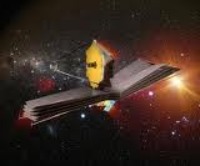Don't Surrender our Telescope Advantage
 Congressional Republicans are moving to terminate a federal project that has been plagued by cost overruns and delays. Good news? No. The project is the James Webb Space Telescope, and scrapping it would be an egregiously shortsighted and wasteful decision.
Congressional Republicans are moving to terminate a federal project that has been plagued by cost overruns and delays. Good news? No. The project is the James Webb Space Telescope, and scrapping it would be an egregiously shortsighted and wasteful decision.
The James Webb Space Telescope, or JWST, is the planned successor to the Hubble Space Telescope as NASA’s flagship space-based observatory. Hubble has provided a remarkable wealth of images and data — such as the deepest-ever look into the universe — but its technology is obsolescent and expected to cease functioning in several years (and with space shuttles no longer flying, Hubble will not get any further servicing calls).
JWST would operate about a million miles from Earth (Hubble is just a few hundred miles up) using advanced instruments to detect light from distant and faint objects; the far-off locale would provide excellent conditions for avoiding unwanted light and heat. The telescope would be optimized for infrared observations, enabling it to peer through dust clouds into the birthplaces of stars and the origins and early development of galaxies. No less exciting, JWST would be aimed at taking images of planets beyond our solar system and seeking signs of water and other factors relevant to possible life.
On July 13, the House Science, Space and Technology Committee approved a bill that would scrap JWST. A subcommittee earlier in the month recommended the move as part of a plan to cut NASA’s overall budget, stating that JWST “is billions of dollars over budget and plagued by poor management.” The bill would fund NASA at $16.8 billion for 2012, which is $1.6 billion less than the 2011 level and $1.9 billion below what the White House requested. The telescope’s fate awaits full votes by the House and Senate.
JWST has indeed had problems. The telescope’s total cost is projected at between $6.2 billion and $6.8 billion, up from an earlier estimate of $5.1 billion. Its launch date, once slated for 2013, was pushed back first to 2015 and then, as budget worries mounted, to 2018. It is fair to say NASA has not lived up to the high administrative standard set by the project’s namesake, Apollo-era agency chief James Webb.
Still, scrapping the telescope is folly. For one thing, much of the money – about $3 billion -- has already been spent; much of the hardware already exists and unlike an unused Saturn V rocket would not even have the merit of serving as an interesting tourist attraction. Furthermore, NASA already has reorganized the project’s management following a report last year by an independent task force.
Above all, the cancellation would be a massive blow, substantive as well as symbolic, to U.S. leadership and competence in science and technology. The damage would be felt far beyond the astronomical community and the scientific and technological workforce involved with the project. It would mean tossing away a powerful educational tool for cultivating scientific interest and literacy in the first place. It would suggest that being on the cutting edge of research is increasingly not an option in America.

